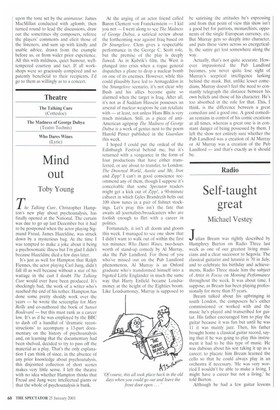Mind out
Toby Young
Le Talking Cure, Christopher Hampton's new play about psychoanalysis, has finally opened at the National. The curtain was due to go up last December but it had to be postponed when the actor playing Sigmund Freud, James Hazeldine, was struck down by a mysterious bug. At the time I was tempted to make a joke about it being a psychosomatic illness but I'm glad I didn't because Hazeldine died a few days later.
It's just as well for Hampton that Ralph Fiennes, the actor playing Carl Jung, didn't fall ill as well because without a star of his wattage in the cast I doubt The Talking Cure would ever have been produced. It's shockingly bad, the work of a writer who's reached the end of his tether. Hampton has done some pretty shoddy work over the years — he wrote the screenplay for Mary Reilly and co-authored the book of Sunset Boulevard — but this must rank as a career low. It's as if he was employed by the BBC to dash off a handful of 'dramatic reconstructions' to accompany a 13-part documentary on the history of psychoanalysis and, on learning that the documentary had been shelved, decided to try to pass off the material as a play. That's the only explanation I can think of since, in the absence of any prior knowledge about psychoanalysis, this disjointed collection of short scenes makes very little sense. I left the theatre with no idea whether Hampton thinks that Freud and Jung were intellectual giants or that the whole of psychoanalysis is bunk.
At the urging of an actor friend called Baron Clement von Franckenstein — I kid you not — I went along to see The Madness of George Dubya, a satirical review about the forthcoming war against Iraq based on Dr Strangelove. Clem gives a respectable performance in the George C. Scott role, but the premise of the play is deeply flawed. As in Kubrik's film, the West is plunged into crisis when a rogue general dispatches a plane to drop a nuclear bomb on one of its enemies. However, while this could plausibly have led to Armageddon in the Strangelove scenario, it's not clear why Bush and his allies become quite so alarmed when the target is Iraq. After all, it's not as if Saddam Hussein possesses an arsenal of nuclear weapons he can retaliate with — at least, not unless Hans Blix is very much mistaken. Still, as a piece of antiAmerican agitprop The Madness of George Dubya is a work of genius next to the poem Harold Pinter published in the Guardian this week.
I hoped I could put the ordeal of the Edinburgh Festival behind me, but it's returned with a vengeance in the form of four productions that have either transferred, or are about to transfer, to London: The Drowned World, Auntie and Me, Iron and Zipp! I can't in good conscience recommend any of them, though I suppose it's conceivable that some Spectator readers might get a kick out of Zipp!, a 90-minute cabaret in which Gyles Brandreth belts out 100 show tunes in a pair of fishnet stockings. Let's pray this isn't the fate that awaits all journalists/broadcasters who are foolish enough to flirt with a career in politics.
Fortunately, it isn't all doom and gloom this week. I managed to see one show that I didn't want to walk out of within the first ten minutes: Who Dares Wines, two-hours worth of stand-up comedy by Al Murray, aka the Pub Landlord. For those of you who've missed out on the Pub Landlord phenomenon, Al Murray is an Oxford graduate who's transformed himself into a bigoted Little Englander in much the same way that Harry Enfield became Loadsamoney at the height of the Eighties boom. Like Loadsamoney, Murray is supposed to be satirising the attitudes he's expressing and from that point of view this show isn't a good bet for patriots, monarchists, opponents of the single European currency. etc. But Murray gets so deeply into character, and puts these views across so energetically, the satire get lost somewhere along the way.
Actually, that's not quite accurate. However impassioned the Pub Landlord becomes, you never quite lose sight of Murray's sceptical intelligence lurking behind the mask. But, unlike lesser comedians, Murray doesn't feel the need to constantly telegraph the distance between his own beliefs and those of his character. He's too absorbed in the role for that. This, I think, is the difference between a great comedian and a good one. A good comedian remains in control of his comic creations at all times, whereas a great one is in constant danger of being possessed by them. I left the show not entirely sure whether the Pub Landlord was a creation of Al Murray or Al Murray was a creation of the Pub Landlord — and that's exactly as it should be.


















































































 Previous page
Previous page